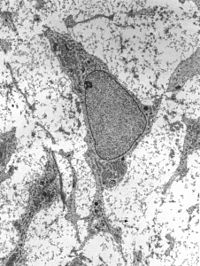
Photo from wikipedia
Abstract Astrocytes are ubiquitous within the central nervous system (CNS). These cells possess many individual processes which extend out into the neuropil, where they interact with a variety of other… Click to show full abstract
Abstract Astrocytes are ubiquitous within the central nervous system (CNS). These cells possess many individual processes which extend out into the neuropil, where they interact with a variety of other cell types, including neurons at synapses. Astrocytes are now known to be active players in all aspects of the synaptic life cycle, including synapse formation and elimination, synapse maturation, maintenance of synaptic homeostasis and modulation of synaptic transmission. Traditionally, astrocytes have been studied as a homogeneous group of cells. However, recent studies have uncovered a surprising degree of heterogeneity in their development and function, suggesting that astrocytes may be matched to neurons to support local circuits. Hence, a better understanding of astrocyte heterogeneity and its implications are needed to understand brain function.
Journal Title: Essays in Biochemistry
Year Published: 2023
Link to full text (if available)
Share on Social Media: Sign Up to like & get
recommendations!